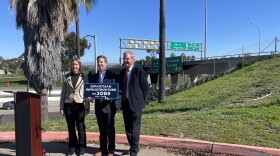STEVE INSKEEP, host:
It's MORNING EDITION from NPR News. I'm Steve Inskeep.
RENEE MONTAGNE, host:
And I'm Renee Montagne.
The prime minister of Israel goes to the White House today. Top of the agenda for Ehud Olmert and President Bush: what's next now that the Palestinians are divided both politically and geographically? Fatah now controls the West Bank and Hamas is in charge of the Gaza Strip. And in an evolving strategy, yesterday the Bush administration lifted the 15-month-old economic and diplomatic embargo against the Palestinian government led by Fatah's Mahmoud Abbas, now that Fatah has expelled Hamas from that government.
We go now to NPR's Eric Westervelt in Jerusalem. Hello.
ERIC WESTERVELT: Good morning, Renee.
MONTAGNE: So the two leaders, Mr. Bush and Ehud Olmert, are expected to discuss ways to bolster Palestinian leader Mahmoud Abbas in his struggle against the Islamist Hamas.
WESTERVELT: That's right. The E.U. and the U.S. have lifted the economic and diplomatic embargoes of the Palestinians imposed after Hamas won elections early last year. And Prime Minister Olmert has said he may soon release to President Abbas millions of dollars in tax revenues withheld since Hamas came to power. So there's cautious optimism, in the West Bank anyway, that full aid money could soon flow again, that government salaries may be paid.
The Bush administration appears to be formulating, you know, what some are calling a West Bank first policy, trying to bolster the more secular moderate Abbas of Fatah in an effort to recover something positive out of Hamas's full takeover of Gaza last week.
MONTAGNE: Now, this would seem to be good for the West Bank but does this not leave Gaza - and it has one and a half million residents - more isolated than ever?
WESTERVELT: That's right. The U.S., the E.U., and Israel see Hamas as a terrorist group that doesn't recognize Israel, and the boycott of Hamas and in effect all of Gaza remains in place. So there's concern that bolstering the West Bank and isolating the Hamas-run Gaza Strip could backfire and further radicalize Gaza and potentially harm ordinary Palestinians who are stuck there.
Hamas officials say, look, we won free and fair elections last year and they call Abbas's emergency government illegal and unconstitutional. And by law Abbas's emergency cabinet can only last for a maximum of 60 days. Hamas has said already it won't go along with any new elections, so it's just not clear what will happen when this Abbas West Bank emergency cabinet runs out.
MONTAGNE: And what can you tell us about the situation facing civilians in the Gaza Strip this morning?
WESTERVELT: Well, it remains difficult. Almost 80 percent of the Palestinian population in Gaza relies on direct food aid from the U.N. and other aid groups. Last night there was a shootout at the Erez crossing, the main civilian crossing between Israel and Gaza, between Palestinians and Israeli soldiers. At least one Palestinian was killed.
And the shooting there, Renee, just underscores this widening problem at these border crossings. Israel and the rest of the international community say they want to avoid a humanitarian crisis in Gaza, but the crossings remain closed and there are a huge practical, logistical issues still to be worked out if regular food and other supplies are to be delivered.
MONTAGNE: Now, President Bush and Mahmoud Abbas spoke by phone yesterday with the Palestinian leader, pressing to get peace talks going again with Israel. What are the prospects of that?
WESTERVELT: Well, many here are saying that neither Prime Minister Olmert nor President Mahmoud Abbas have the political capital to really deliver or make progress on any peace talks, Renee, even if those talks are focused solely on the West Bank and exclude Gaza. And perhaps tellingly, there is no news conference scheduled between President Bush and Prime Minister Olmert following their White House meeting today.
MONTAGNE: Eric, thanks very much. NPR's Eric Westervelt in Jerusalem. Transcript provided by NPR, Copyright NPR.







